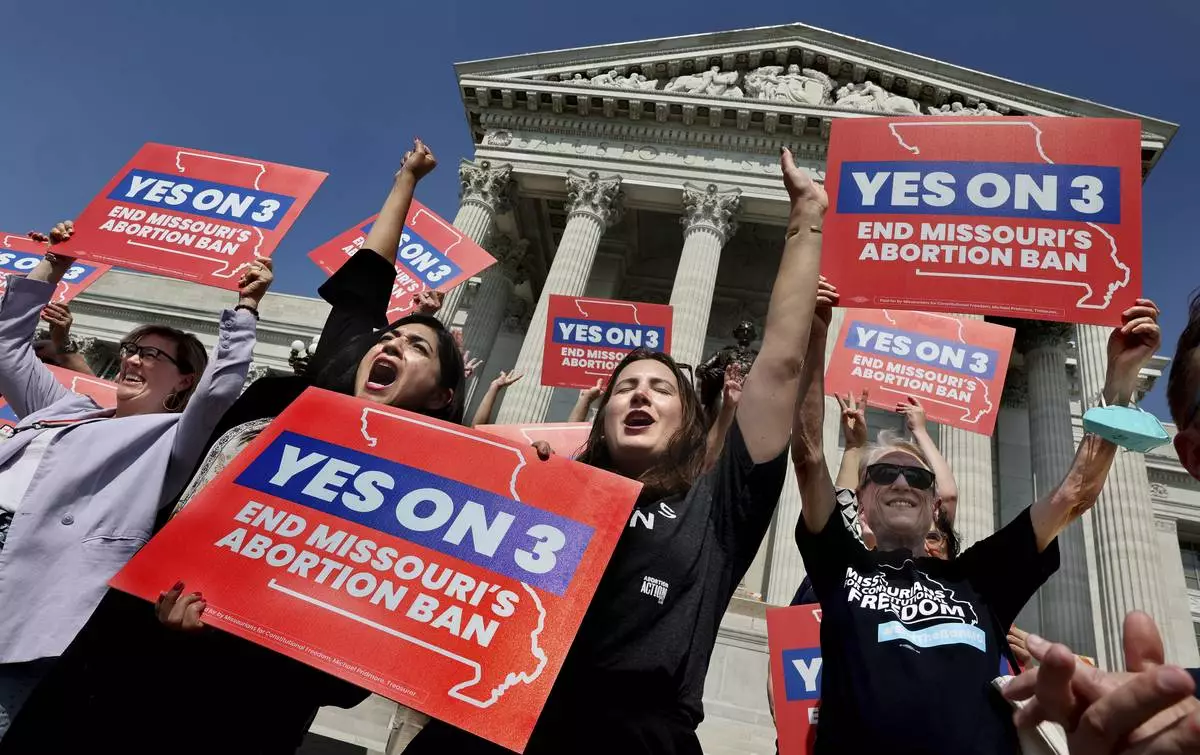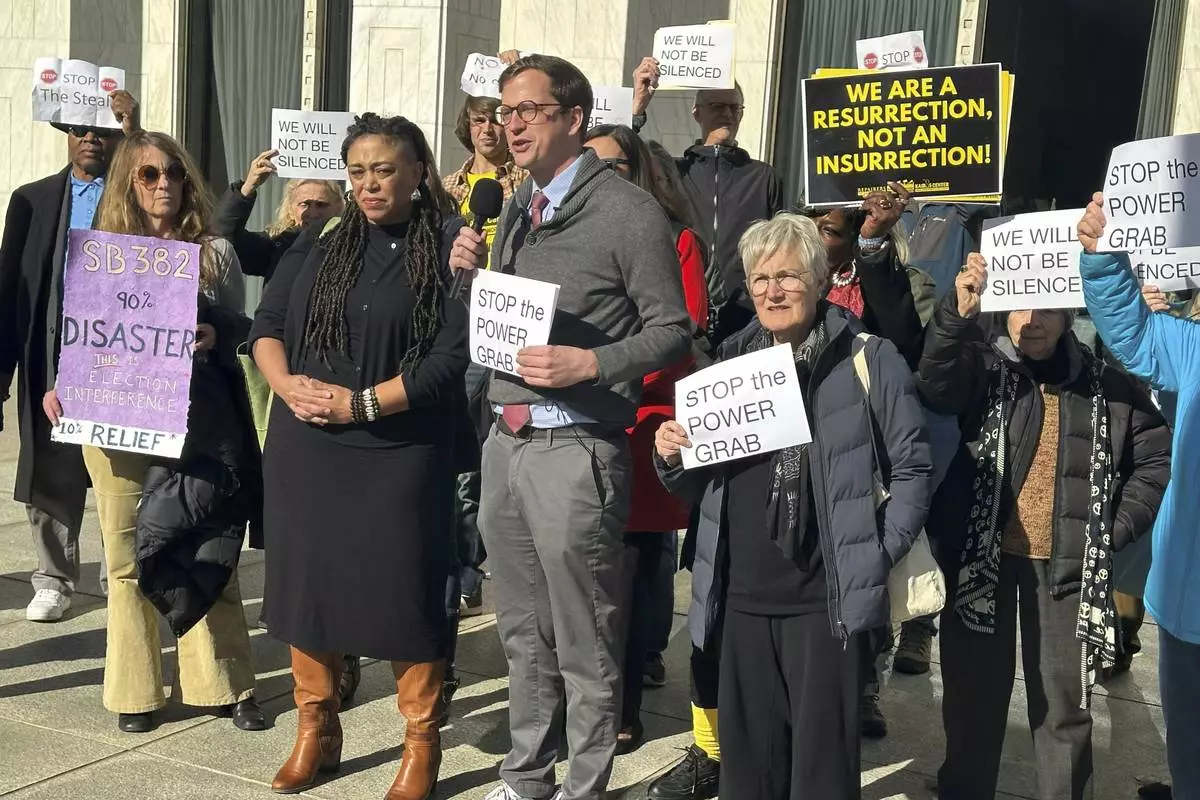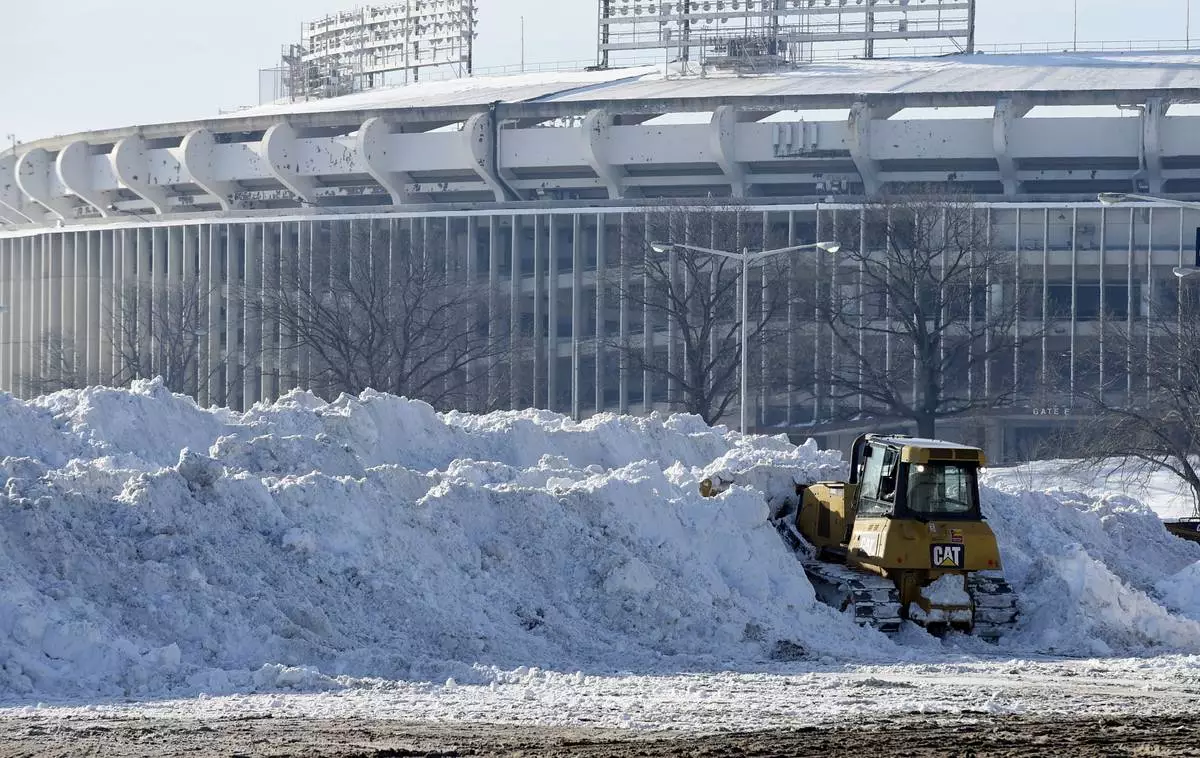WASHINGTON (AP) — While the election was over a month ago, voters in some parts of the country are discovering that having their say at the ballot box is not necessarily the final word.
Lawmakers in several states have already initiated or indicated plans to alter or nullify certain results. Republican lawmakers in North Carolina are moving to undercut the authority of the incoming Democratic governor, Republicans in Missouri are taking initial steps to reverse voter-approved abortion protections, and Democrats in Massachusetts are watering down an attempt by voters to hold the Legislature more accountable.
The actions following the Nov. 5 election continue a pattern that has accelerated in recent years and has been characterized by critics as undemocratic.
“I think certainly when you’re a voter and you’re voting on the issue, you’re not thinking about whether someone’s then going to overturn or just ignore the things that you voted on,” said Anne Whitesell, an assistant professor of political science at Miami University in Ohio.
The strategies range from outright reversals to “slow walking” the implementation of voter-approved ballot initiatives, such as lawmakers refusing to provide funding. Whitesell said that was a prevalent strategy for some Republican governors and lawmakers after voters in their states approved expanding Medicaid coverage following the passage of the Affordable Care Act. The matter ultimately had to be settled in the courts, extending the lag time between vote and implementation.
"When you’re a voter, that’s not what you’re thinking is going to happen,” Whitesell said.
North Carolina provides one of the most egregious examples of a legislature moving to counter the will of the voters.
Barring pending protests changing a legislative race result, voters there ended the Republican supermajority for the upcoming two-year session and elected Democrats to several statewide offices, including governor and attorney general. Despite that, Republican lawmakers holding a lame-duck session pushed through a series of wide-ranging changes before they lose their veto-proof majority next year.
Those include taking powers from several of the Democrats elected to statewide office. Under the abrupt changes, the new governor would lose the authority to appoint members to the state elections board. Current Gov. Roy Cooper, a Democrat, vetoed the bill, but that action was overridden by the Republicans in the state Senate. The House vote is expected this coming week.
The Republican change would put control of the state election board in the hands of the state auditor, which was won by a Republican last month. The legislation also weakens the authority of the governor to fill vacancies on the state court of appeals and the state supreme court, while prohibiting the attorney general from taking legal positions contrary to the legislature's.
The Rev. Rob Stephens, an organizer with Repairers of the Breach and the Poor People's Campaign, was among those who protested the moves at the state Legislative Building. He said North Carolinians had “voted to end single party rule" and select the state officials to lead the incoming government, only to have that threatened by Republican lawmakers in a process he called “a betrayal of democracy.”
Patrick Williamson, general counsel with the Fair Elections Center, an election reform group based in Washington, D.C., said more than 5.7 million North Carolina voters elected whom they wanted and did so with the understanding of what authorities those officials would have.
“This runs entirely contrary to what voters expected when they were casting their ballots in November," he said.
He also said the actions run counter to voters' actions in 2018, when they rejected a proposed constitutional amendment that sought to strip part of Cooper’s authorities surrounding the elections board.
In Missouri, voters approved a constitutional amendment last month enshrining abortion rights into the state constitution. Shortly after, a Republican state senator introduced a new attempt at a constitutional amendment that “prohibits the performance or inducement of an abortion upon a woman, except in cases of medical emergency.”
Massachusetts voters overwhelmingly approved giving the state auditor the authority to audit the Legislature. But Democrats, who control both chambers, have said the vote violates the separation of powers.
After the election, lawmakers in the House approved a change to the process by which they would seek an independent financial audit of their practices. State Auditor Diana DiZoglio, a Democrat who championed the ballot question, said lawmakers are trying to take the teeth out of the measure and give themselves the ability to control the scope of any review.
The actions taken by some legislatures after the November election continue a recent pattern.
In Ohio, legislation is pending in the Republican-controlled Legislature that could significantly alter an initiative voters approved last year legalizing recreational marijuana use. Key changes include doubling the approved tax rate on adult-use cannabis and cutting in half the number of plants per household that Ohioans agreed could be grown at home.
Voters in several Texas cities in recent years — including Dallas last month — also have passed measures that decriminalize small amounts of marijuana. But the state’s Republican attorney general has taken them to court, arguing that cities can’t override Texas’ strict laws banning marijuana.
In Tennessee, the Republican-led Legislature has tussled for years with left-leaning Memphis and Nashville to override some of their local policies. Memphis voters in 2008 approved ranked-choice voting and rejected an attempt to repeal it a decade later. But in 2022, lawmakers banned ranked-choice voting statewide.
After Nashville voters approved a community oversight board for the city's police force, the Republican-controlled Legislature passed a law in 2023 that gutted such bodies.
Earlier this year, the Utah Supreme Court ruled that lawmakers had infringed on the constitutional rights of voters after they established a citizen-led redistricting commission to draw new congressional maps. Voters passed the initiative in 2018, but the GOP-controlled Legislature reduced the commission’s authority two years later and drew its own gerrymandered maps, touching off the legal fight.
In 2018, Democrats who control the District of Columbia council voted to repeal a voter-approved measure that would have raised the minimum wage for servers and other tipped workers.
Nowhere has legislative pushback garnered as much outside attention this year as in North Carolina, where some critics characterize the moves by Republican lawmakers as an audacious power grab.
John Fortier, senior fellow at the conservative American Enterprise Institute, said he does not know the specifics of the lame duck session in North Carolina, but said the GOP legislation sounds like part of a long-standing battle between the parties over who should wield certain powers.
“I agree, this does not always look pretty,” he said. "You think there’s some norms you should want to settle on, but I do think there’s been a shifting set of norms there.”
Chris Melody Fields Figueredo, executive director of the left-leaning Ballot Initiative Strategy Center, said what is happening in North Carolina is why the center emphasizes that Election Day is not the end of the work.
Activists have to let voters know that attempts to ignore or overrule their actions at the ballot box are direct assaults on representative government, she said, yet many of these attempts often go unnoticed by voters.
To people who are struggling to pay for food or housing, “the concept of democracy feels very vague,” she said.
Associated Press writers Summer Ballentine in Jefferson City, Missouri, Steve LeBlanc in Boston, Jonathan Matisse in Nashville, Tennessee, Julie Carr Smyth in Columbus, Ohio, and Paul Weber in Austin, Texas, contributed to this report.

FILE - Amendment 3 supporters Luz Maria Henriquez, second from left, executive director of the ACLU Missouri, celebrates with Mallory Schwarz, center, of Abortion Action Missouri, after the Missouri Supreme Court in Jefferson City, Mo., ruled that the amendment to protect abortion rights would stay on the November ballot. Abortion-rights advocates will ask a judge Wednesday, Dec. 4, 2024 to overturn Missouri’s near-total ban on the procedure, less than a month after voters backed an abortion-rights constitutional amendment. (Robert Cohen/St. Louis Post-Dispatch via AP, File)

The Rev. Rob Stephens with the NC Poor People's Campaign speaks at a news conference outside the North Carolina Legislative Building in Raleigh, N.C. on Monday, Dec. 2, 2024. (AP Photo/Gary D. Robertson)










